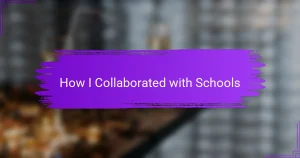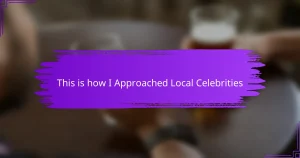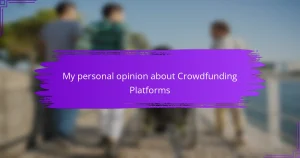Key takeaways
- Supportive networks foster trust and a sense of belonging, transforming challenges into opportunities through emotional connections.
- Obama supporter communities blend political engagement with personal friendships, enriching both social and civic life.
- Building trust within a network requires consistency, honesty, and vulnerability, creating a safe space for genuine connections.
- Maintaining and growing a network relies on regular check-ins, stepping out of comfort zones, and showing authentic interest in others.
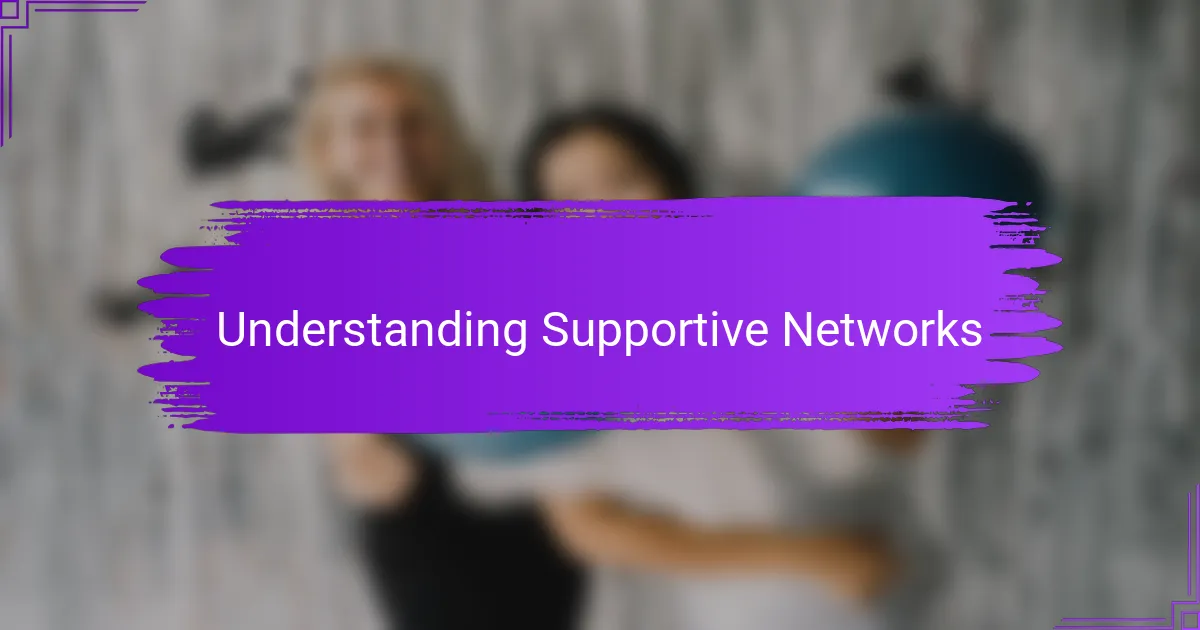
Understanding Supportive Networks
Supportive networks are more than just groups of people—they are communities where trust and encouragement flow naturally. From my experience, having a circle that genuinely listens and stands by you can transform challenges into opportunities. Have you ever noticed how a simple word of encouragement during tough times can change your entire outlook?
I remember when I first joined the Obama supporter community, the warmth and shared purpose made me feel immediately connected. It wasn’t just about agreeing on politics; it was about knowing there were others who understood my passion and frustrations. That emotional bond turned casual connections into a true support system.
What makes these networks truly special is the balance between giving and receiving support. It’s not always about seeking help; sometimes, just knowing you can lend a hand creates a deep sense of belonging. Don’t you think that’s what we all want—a space where we matter and can contribute?
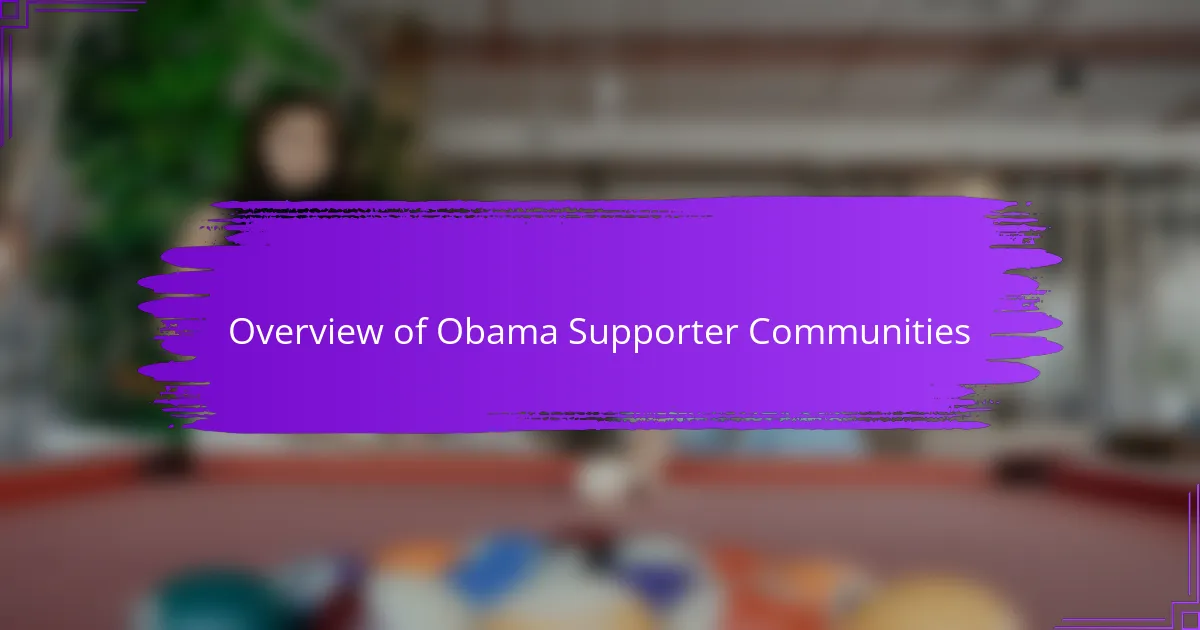
Overview of Obama Supporter Communities
Obama supporter communities have always struck me as vibrant hubs where activism meets friendship. From online forums buzzing with ideas to local meetups brimming with energy, these spaces create a unique blend of political engagement and personal connection. Have you ever felt the excitement of being part of a group that shares both your hopes and your commitment to change?
When I first attended an Obama support rally, I was amazed by the diversity and passion all around me. It wasn’t just the signs or chants—it was the feeling that I wasn’t alone in believing in a better future. This sense of unity, fueled by shared values and goals, makes these communities different from ordinary political groups.
What’s truly remarkable is how these networks extend beyond politics into ongoing friendships and mentorships. I found that through them, I gained not only allies for campaigns but also friends who supported me personally. Isn’t that the kind of network we all want—a group that lifts us up both politically and personally?
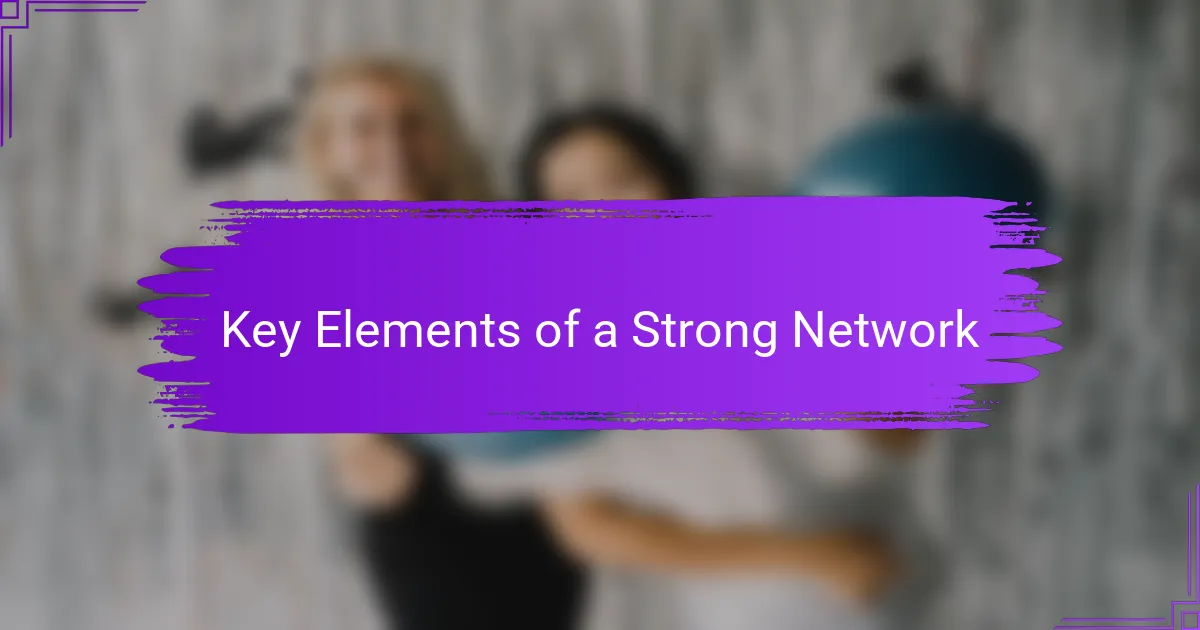
Key Elements of a Strong Network
A strong network hinges on trust—without it, connections feel fragile and uncertain. In my experience, being able to share honest thoughts without fear of judgment creates a foundation where relationships deepen and support becomes authentic. Have you ever felt the relief that comes from opening up to someone who truly gets you?
Consistency also plays a crucial role. When people show up regularly, whether online or in person, it nurtures reliability and a sense of dependability. I recall times when just knowing someone would check in made all the difference during overwhelming moments—it’s that steady presence that turns acquaintances into allies.
Lastly, shared values are the glue that binds a network together. When everyone rallies around common goals and beliefs, the energy becomes contagious, fueling motivation and commitment. Don’t you find it easier to stay engaged when you’re surrounded by people who genuinely care about the same things you do?
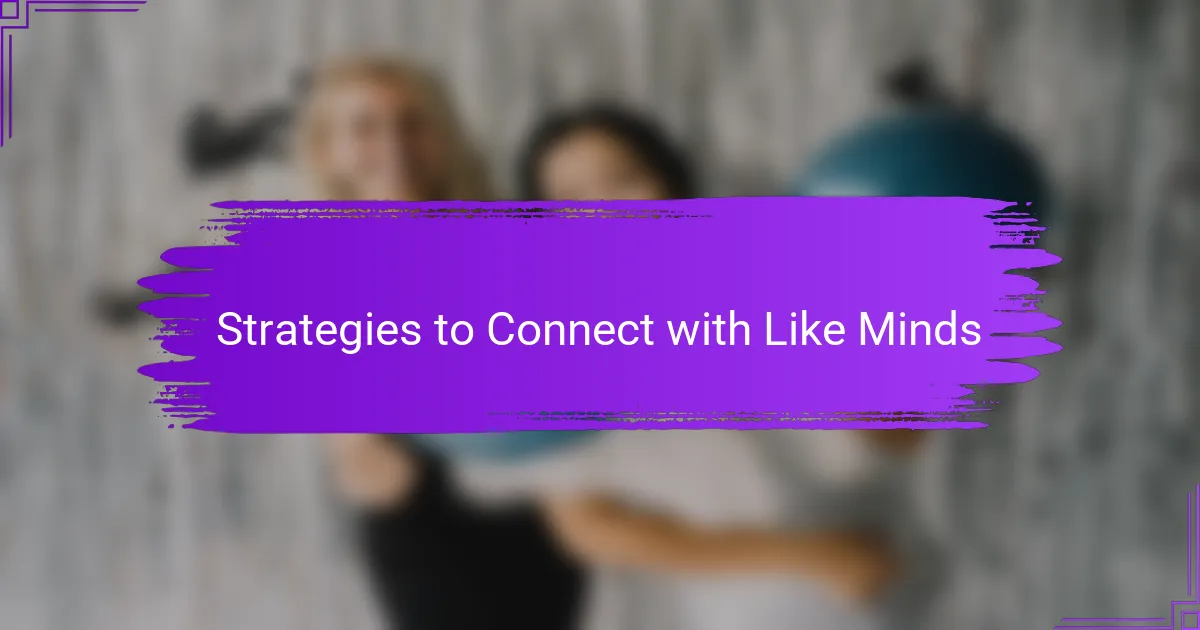
Strategies to Connect with Like Minds
One strategy that worked wonders for me was attending events and meetups specifically tailored for Obama supporters. Walking into a room filled with like-minded individuals can feel intimidating at first, but those shared beliefs quickly become a bridge. Have you ever experienced that instant connection when you realize others care just as deeply as you do? I’ve found that these occasions spark genuine conversations and lasting friendships.
Another approach I found valuable was actively participating in online forums and social media groups dedicated to our community. Engaging in discussions not only helped me exchange ideas but also showcased my genuine passion, making it easier to connect authentically. From my perspective, consistent interaction online can replicate the warmth of in-person meetings, especially when everyone shares that common commitment to progress.
Finally, reaching out with a simple message or comment has often opened doors I didn’t expect. I learned that expressing curiosity about someone’s experience or offering support can break the ice and build trust. Have you ever thought about how a small step like that can lead to meaningful relationships? In my journey, these small acts often paved the way for deeper bonds within the community.
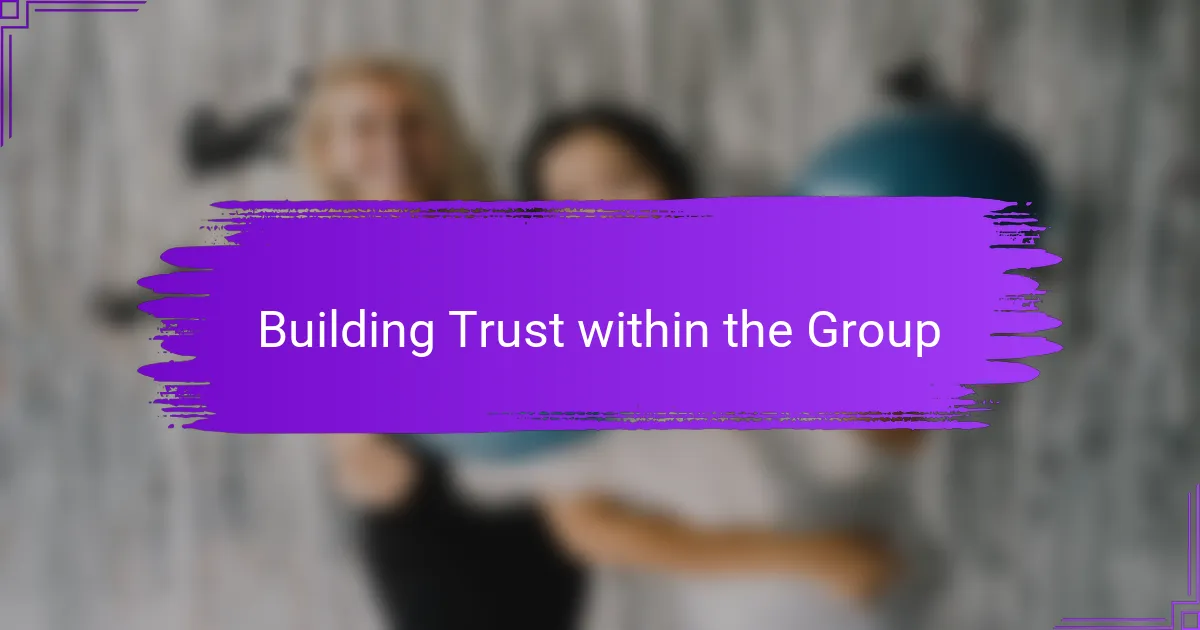
Building Trust within the Group
Trust doesn’t happen overnight; it’s something I saw grow little by little as we shared our stories and listened without judgment. I remember the first time I opened up about my doubts, and instead of criticism, I found understanding—that moment sealed a bond that felt genuine and rare. Have you ever felt that relief when someone meets your vulnerability with kindness rather than skepticism?
Showing up consistently also built trust in a way words couldn’t. When members checked in on me during a tough week, their steady presence said louder than any promise, “You’re not alone.” That kind of reliability turned acquaintances into people I could truly count on. Isn’t it amazing how just being there makes all the difference?
Another key was embracing transparency about my intentions and mistakes within the group. Admitting I didn’t have all the answers, but was committed to learning, encouraged others to do the same. I noticed how this openness created a safe space where trust wasn’t just expected—it was earned through honest connection. Doesn’t that feel like the foundation for any strong community?
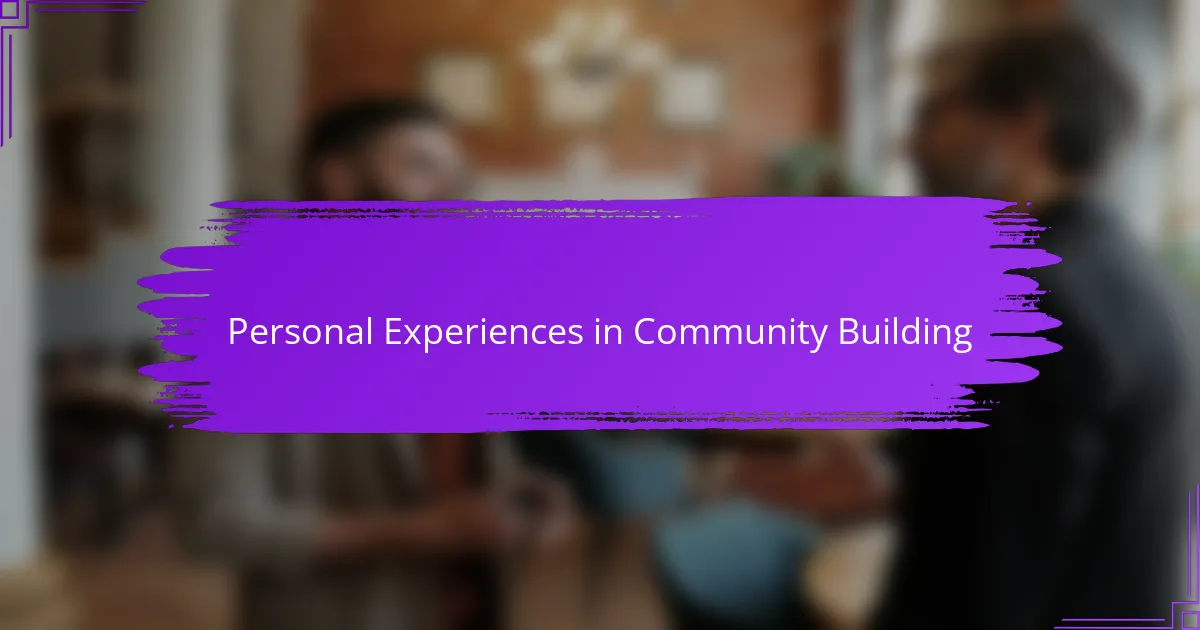
Personal Experiences in Community Building
When I first stepped into the heart of our Obama supporter community, I was surprised by how quickly personal connections formed around shared stories and experiences. I recall one meeting where a member’s heartfelt account of overcoming political disillusionment sparked an open, emotional conversation that made me realize how vital these exchanges are to building trust. Isn’t it incredible how simply sharing a personal truth can create a ripple of understanding and solidarity?
In my experience, being vulnerable about my own doubts and frustrations didn’t weaken my standing—it actually deepened my bonds within the group. I remember feeling nervous about admitting my uncertainties, but the warm responses I received made me feel seen and accepted. Have you noticed how opening up honestly often invites others to do the same, transforming mere acquaintances into dependable allies?
Consistency has played a pivotal role too. Showing up regularly, whether for weekly calls or informal chats, helped me build a rhythm of connection that felt reliable and comforting. One moment stands out when a simple check-in from a fellow supporter lifted my spirits during a particularly challenging week. Doesn’t that steady presence feel like the glue that holds a community together?
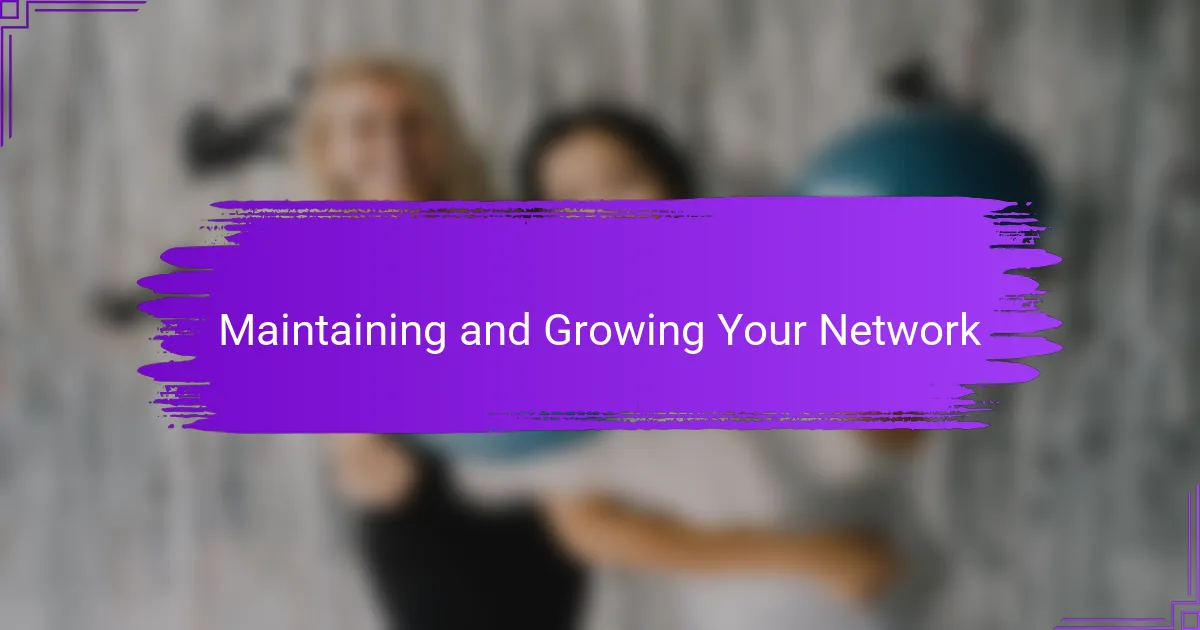
Maintaining and Growing Your Network
Keeping a network strong requires ongoing effort, and from what I’ve seen, regular contact is key. I make it a point to check in with friends and fellow supporters, whether through a quick message or joining community calls. Have you ever noticed how even a brief “How are you doing?” can brighten someone’s day and reinforce that bond?
Growing the network often means stepping beyond your comfort zone, something I’ve learned through attending new events or engaging with different online groups. Each introduction, no matter how small, can open doors to fresh perspectives and deeper connections. I remember feeling nervous the first time I reached out to a seasoned community member—but that simple hello turned into a meaningful mentorship.
At the heart of maintaining and expanding these relationships is genuine curiosity and support. When I show interest in others’ experiences and celebrate their wins, it naturally encourages reciprocity. Don’t you think that when we invest in others with authenticity, our circles don’t just grow—they thrive?
